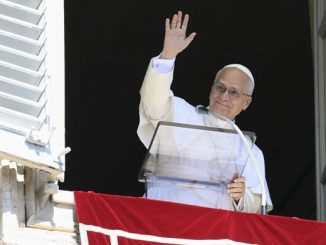 Pope Leo XIV in St. Peter’s Square at the Vatican for his weekly General Audience, September 24, 2025. / Vatican Media
Pope Leo XIV in St. Peter’s Square at the Vatican for his weekly General Audience, September 24, 2025. / Vatican Media
Vatican City, Sep 24, 2025 / 07:24 am (CNA).
Pope Leo XIV renewed the Holy See’s support for a two-state solution in the Holy Land and voiced concern over rising tensions in Ukraine, speaking with reporters Tuesday before returning from Castel Gandolfo to the Vatican.
“The Holy See has supported the two-state solution for many years,” the pope recalled, pointing out that the Vatican formally recognized Palestine in 2015 with the signing of the Global Agreement. He added, “The Holy See recognized the two-state solution some time ago. That is clear: we must seek a path that respects all peoples.”
Asked whether broader international recognition of Palestine might help, he said: “It could help, but right now there is no real willingness to listen on the part of the other side; dialogue is broken.”
The pope confirmed that he had spoken by phone the same day with the Catholic parish in Gaza. “Thank God, the parish is fine, although the incursions are getting closer and closer… This afternoon I got in touch with them,” he said.
On Ukraine, he cautioned: “Someone is seeking an escalation. It’s getting more and more dangerous. I continue to insist on the need to lay down arms, halt military advances, and return to the negotiating table.” He stressed the importance of European unity, saying, “If Europe were truly united, I believe it could do a lot.”
Pressed on whether rearmament in Europe is necessary, the pope declined to weigh in directly: “These are political matters, also influenced by external pressure on Europe. I prefer not to comment.”
Regarding Vatican diplomacy, he explained: “We are in constant dialogue with ambassadors. We also try to speak with heads of state when they come, always seeking a solution.”
Rosary for peace in October
At his weekly general audience on Wednesday, Pope Leo XIV called on Catholics around the world to dedicate October to praying the Rosary for peace.
“Dear brothers and sisters, the month of October is now approaching, and in the Church it is dedicated in a special way to the Holy Rosary. Therefore, I invite everyone, every day of the coming month, to pray the Rosary for peace: personally, in the family, in the community,” he said.
The pope asked Vatican employees to join in this prayer daily at 7 p.m. in St. Peter’s Basilica. He also announced that on Saturday, Oct. 11, at 6 p.m., he will lead a Rosary in St. Peter’s Square during the vigil for the Jubilee of Marian Spirituality, marking as well the anniversary of the opening of the Second Vatican Council.
Catechesis: Christ descends to the depths
Continuing his catechesis for the Jubilee of 2025 on the theme Jesus Christ our Hope, the pope reflected on the mystery of Holy Saturday and Christ’s descent into the realm of the dead.
“Today, again, we will look at the mystery of Holy Saturday. It is the day of the Paschal Mystery in which everything seems immobile and silent, while in reality an invisible action of salvation is being fulfilled: Christ descends into the realm of the dead to bring the news of the Resurrection to all those who were in the darkness and in the shadow of death,” he said.
“This event, which the liturgy and tradition have handed down to us, represents the most profound and radical gesture of God’s love for humanity,” the pope said. “Indeed, it is not enough to say or to believe that Jesus died for us: it is necessary to recognize that the fidelity of his love sought us out where we ourselves were lost, where only the power of a light capable of penetrating the realm of darkness can reach.”
He noted that Christ’s descent is not just a past event, but one that touches every believer today: “The underworld is not only the condition of the dead, but also of those who live death as a result of evil and sin. It is also the daily hell of loneliness, shame, abandonment, and the struggle of life. Christ enters into all these dark realities to bear witness to the love of the Father. Not to judge, but to set free. Not to blame, but to save.”
The pope concluded: “Dear brothers and sisters, to descend, for God, is not a defeat, but the fulfillment of his love. It is not a failure, but the way by which he shows that no place is too far away, no heart is too closed, no tomb too tightly sealed for his love. This consoles us, this sustains us. And if at times we seem to have hit rock bottom, let us remember: that is the place from which God is able to begin a new creation.”
[…]








